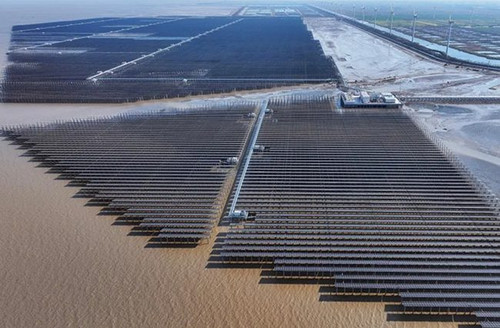Welcome to DU!
The truly grassroots left-of-center political community where regular people, not algorithms, drive the discussions and set the standards.
Join the community:
Create a free account
Support DU (and get rid of ads!):
Become a Star Member
Latest Breaking News
Editorials & Other Articles
General Discussion
The DU Lounge
All Forums
Issue Forums
Culture Forums
Alliance Forums
Region Forums
Support Forums
Help & Search
Environment & Energy
Related: About this forumA Modern Blueprint for Coastal Power: China's Offshore Solar-Hydrogen Integration

A Modern Blueprint for Coastal Power: China’s Offshore Solar-Hydrogen Integration
Powermag.com | Sonal Patel | July 1st, 2025
Built on degraded tidal flats in China’s Jiangsu Province, CHN Energy’s Rudong project combines 400 MW of offshore photovoltaic generation, grid-scale battery storage, and green hydrogen production with ecological restoration and fully automated operations.
Rudong County, located on the Yellow Sea coast of eastern China’s Jiangsu Province, is a region defined by fertile tidal flats, a rich agricultural heritage, and an extensive 66-mile-long coastline. The region’s landscape is a patchwork of verdant fields and productive wetlands, bolstered by its subtropical monsoon climate, abundant rainfall, and flat terrain. But over the past four decades, Rudong’s tidal flats faced an escalating ecological crisis, driven by both human development and biological invasion.
Since the 1950s, nearly 40,000 hectares of land (98,842 acres) have been reclaimed in Rudong alone, transforming mudflats into farmland, aquaculture ponds, and industrial zones. The relentless transformation has been compounded by reduced sediment supply from major rivers like the Yangtze, owing to upstream damming and sand mining. It has led to drastic coastal erosion, narrowing and steepening of the tidal flats, and a loss of their natural capacity to buffer storm surges and sustain biodiversity...snip
...Hydrogen Horizons
The Rudong project’s 1,500 Nm3/h hydrogen plant—powered entirely by surplus solar energy—is a core demonstration of China’s push for integrated green hydrogen infrastructure. Developed by CHN Energy’s Beijing Low Carbon Clean Energy Research Institute, the facility uses modular alkaline electrolyzers that allow flexible hydrogen production across variable solar generation conditions. According to CHN Energy, each electrolyzer produces 500 Nm3/h and uses nickel-based catalysts to reduce rare metal dependence, enhancing scalability for coastal deployment. Hydrogen is reportedly compressed to 35 MegaPascal (MPa) using corrosion-resistant diaphragm systems from Jiangsu Zhongtian Technology and stored in six 18-meter Type IV composite tanks with a total capacity of 3,600 kg...more
https://www.powermag.com/a-modern-blueprint-for-coastal-power-chinas-offshore-solar-hydrogen-integration/
Powering the Future: Solar and Hydrogen Innovations in China
"Hydrogen cars blow up"
"Wind Turbines cause cancer"
"I don't want these solar things where they go for miles and they cover up a half a mountain that are ugly as hell."
Quotes from "The Leader of the Free World"
It would be funny if it wasn't so GD SAD, wouldn't it.
1 replies
 = new reply since forum marked as read
Highlight:
NoneDon't highlight anything
5 newestHighlight 5 most recent replies
= new reply since forum marked as read
Highlight:
NoneDon't highlight anything
5 newestHighlight 5 most recent replies
A Modern Blueprint for Coastal Power: China's Offshore Solar-Hydrogen Integration (Original Post)
Caribbeans
Jul 6
OP
NNadir
(36,208 posts)1. What the fossil fuel industry is marketing here is the destruction of wetlands. It's bad enough when they do so...
...to drill, but when they do it simply to advertise dishonestly that fossil fuels are "green hydrogen," it's even more obscene.
In China, hydrogen is made from fossil fuels, and all the slick ads here can change that fact.
Subsidizing Grid-Based Electrolytic Hydrogen Will Increase Greenhouse Gas Emissions in Coal Dominated Power Systems Liqun Peng, Yang Guo, Shangwei Liu, Gang He, and Denise L. Mauzerall Environmental Science & Technology 2024 58 (12), 5187-5195
The text is clear enough.
From the introductory text:
The bold, italics and underlining is mine.
The text is clear enough.
From the introductory text:
... Currently, nearly all hydrogen in China is either produced directly from fossil fuels (55% from coal gasification and 14% from steam methane reforming (SMR)) or as a byproduct of petroleum refining (28%), with only 1% coming from water electrolysis. (2) Producing 1 kg of coal- or SMR-based hydrogen emits roughly 19 and 10 kg of CO2, respectively. (3) In 2020, hydrogen production from fossil fuels in China emitted approximately 322Tg of CO2, equivalent to 25% of total CO2 emissions from industrial processes, a number expected to rise with increasing hydrogen demand. (4) Industrial processes include production of nonmetallic mineral products, chemical, and metal products, as well as production and consumption of halocarbons and sulfur hexafluoride. (4)
.
The bold, italics and underlining is mine.